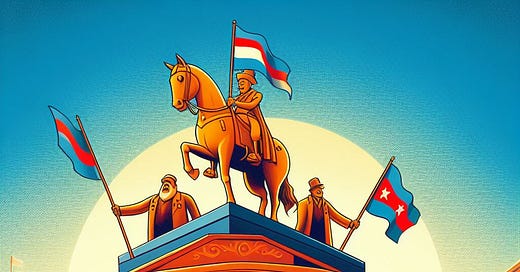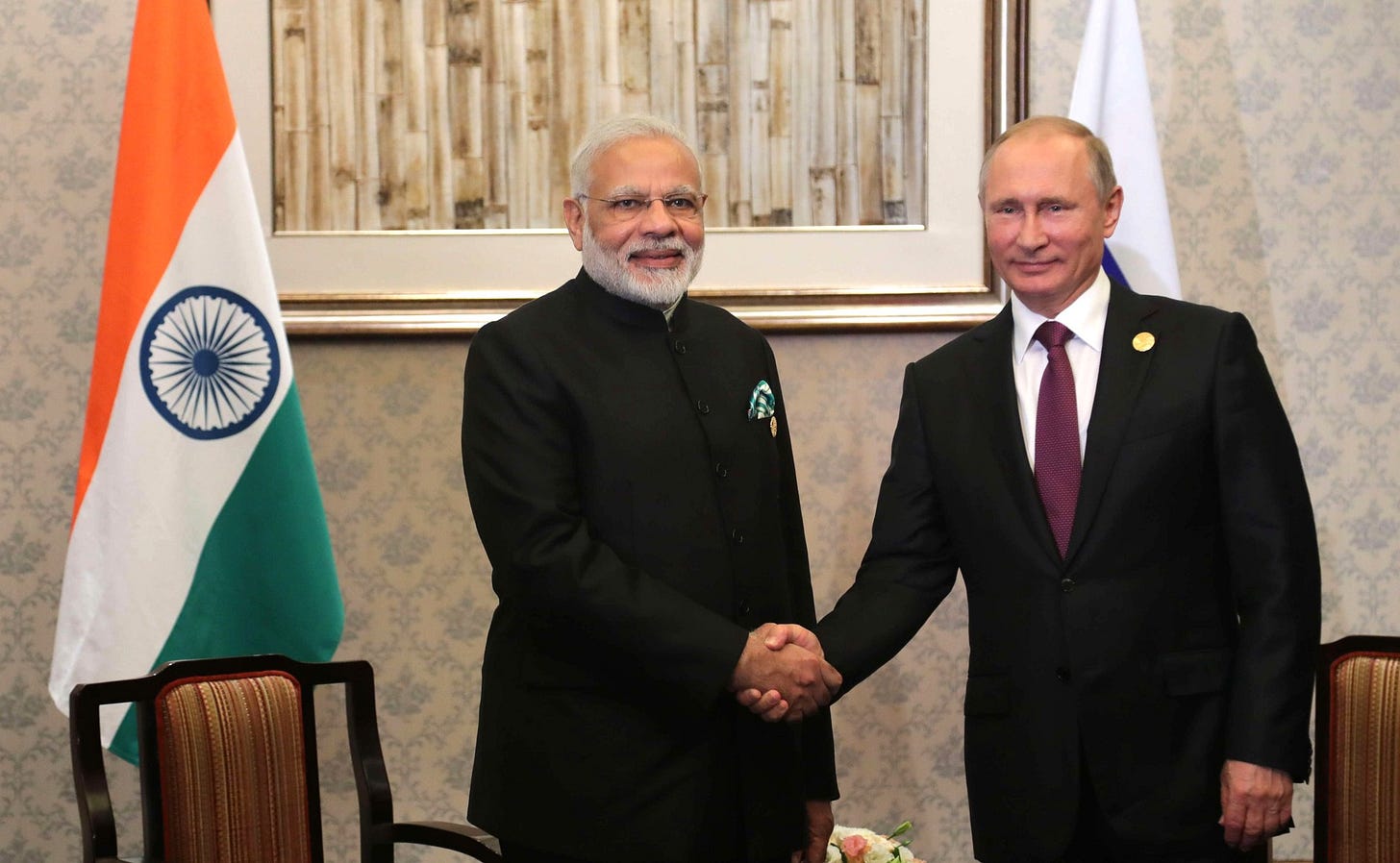2024: the year democracy is voted out?
The world will see the most elections in history in 2024. But if voters in the US, EU, UK, India, Indonesia, Russia, Mexico and South Africa embrace nationalist autocracy, it will be a turning point.
It is often said in the US these days, with characteristic humility, that the American Experiment in democracy is now being tested. In reality the global democratic experiment, which the world has been undertaking only for the past two centuries, is of course not uniquely American. But it is under threat, not just in the United States but all over the world. And 2024 will be the year that tests whether it is going to hold firm, or fall to the gathering storm of autocracy.
2024 will see the most elections of any year in history. The most-watched will be the US election in November, when votes can be cast by 231 million people. This is the big one, the election which will determine whether the world will be thrown into chaos. But 2024 will also see the EU election in June, where 400 million Europeans are eligible to vote. The EU election every five years is the second-biggest election in the world, after India, whose 879 million eligible voters will also cast ballots, in May. Russians are expected to vote to re-elect Vladimir Putin in a free but unfair election in March. Other elections include Mexico in June, Indonesia in February, and South Africa and Britain at some point before the end of the year. Should its shaky coalition government fall in the next months, Germany could also see an election.
In Russia and India, elections are expected to solidify the rule of the strongmen in power (though the opposition in India could unite to defeat Hindu nationalist Narendra Modi). In the EU, far-right nationalist parties are expected to majorly increase their share and could do well enough to, for the first time, block the ‘grand coalition’ of centrists from forming a majority in the European Parliament. In the UK, the increasingly unhinged nationalist Tory government which has been in power for 14 years is expected to be roundly defeated by the opposition Labour Party. In Germany, Belgium and Austria the far right is in the ascendent and could provoke major chaos with an electoral win as happened in November in The Netherlands.
American voters may be just a small percentage of the people going to the polls in the coming year, but theirs is the most important. They will be deciding the fate of the world. Should Donald Trump be elected it would likely throw the country, and the wider world, into a chaos which permanently alters the global order. NATO would likely crumble, Europe would be thrown into uncertainty, China would be ascendant, the United States could descend into civil war, and a third world war would become suddenly very likely. This is not hyperbole, and it should be no comfort to people around the world that Donald Trump already served a term and the world didn’t collapse. It is clear that a second term would be very different than the first, with the loss of the ‘grown ups in the room’ and the guard rails removed. Trump has indicated his main priorities are revenge and dictatorship, and has even said outright he will be a dictator on day one.
What is clear from polling and election results across the Western world over the past eight years is that many people have lost faith in liberal democracy and are ready to try something new (or old, as the case may be). Europe and America have a 1930s feeling at the moment, with the rise of nationalists promising to uproot the old order and run roughshod over the rule of law that has been painstakingly set up over the past 80 years.
As the US election draws closer and Trump’s rhetoric becomes more and more blatantly authoritarian, there have been more and more warnings to Americans that they are sleepwalking into a Trump dictatorship. The big question is whether they’re really sleepwalking, or whether this is something they’re actively choosing with eyes wide open. The first time around, in 2016, you could argue that people were taken in by Trump’s charisma but didn’t understand his authoritarian leanings. But in 2020 it is all laid bare. He has openly said he will abuse his office to punish his enemies. He has said he will be a dictator “on day one”. He has said he will do something about Africans, Asians and Latin Americans “poisoning the blood of our country”. He has said he wants to pull out of NATO and will end the Ukraine war presumably by forcing the country to surrender to Putin. He wants to build alliances with other nationalist authoritarians around the world like Putin, Orban, Erdogan and Modi. Americans have heard all of this, and half of them say they want to vote for this future. Telling them that Trump will erode liberal democracy is not going to change their minds. These people have made up their minds. They do not want liberal democracy, they want to live in an authoritarian state where their enemies, who they presume are also Trump’s enemies, will be punished.
Likewise, in Europe, the warnings about the dangers presented by Orban, Wilders, Le Pen, Meloni and the far-right racist Vlaams Belang in Belgium are not convincing citizens (a minority far smaller than Trump’s support in the US) to drop their support for them. If anything, those warnings from opponents only seem to be strengthening the appeal of these far-right nationalist parties. In Turkey this year, voters rejected their last chance to change the country’s direction toward authoritarian Islamic rule. And in India, as Hindu voters are warned that Modi’s brand of Hindu nationalism which excludes the country’s Muslims (the largest Muslim population in the world) erodes Gandhi’s foundation of India as a secular state and will lead to civil war, most don’t seem to care.
People are ready for a change, and at this stage their preference seems to be a change to the authoritarian systems of government we remember from the 1930s. Most people don’t seem terribly concerned about the norms built over the past 80 years being shattered. With these key elections coming over the next 12 months, there is precious little time to convince them otherwise. With this overwhelming public mood across the world, it is time to start thinking about which democratic systems will prove the most resilient. From where I stand, the European Union still stands as the system most likely to weather this storm and remain as the world’s last hope.
As Alexander Clarkson recently argued, America’s situation with Trump is so much more dangerous than Europe’s problem with its tin pot wannabe dictators that it is absurd to compare the two. It is America, not Europe, that is in danger of imminent civil war. But given Europe’s dependence on the United States, the sudden collapse of the American protectorate would have profoundly dangerous implications for this continent as well.
It’s a scary time. For Europeans, the focus should be on what they can change, and what they can control. Despite the profound impact of the US presidency on them, Europeans don’t get a vote in that election. Nor can they impact whether Russians will re-elect Putin or Indians will re-elect Modi. They have no say in the direction of the Chinese Communist Party. But they can vote in European elections. And it isn’t enough to simply not vote for the far-right nationalist parties. If Europeans want to keep themselves safe from this increasingly dangerous world, they need to vote for fully awake politicians who are calling for European sovereignty and an end to dependence on America. And in order to achieve that sovereign independence, they need to vote for politicians who unabashedly support EU ever-closer union.
It is a great irony that, in this year of the most democratic choice the world has ever seen, people feel less in control than they have in many decades. What’s clear at this point is that, as Lampedusa wrote, for things to remain the same everything must change. If Europeans want to protect themselves from these unnerving global developments, it means strongly supporting a sovereign united federal EU underpinned by uncompromised liberal democratic values.
Who are the politicians brave enough to make these necessary changes? With the passing of former EU president Jacques Delors this week, we were reminded of what it means to be a visionary committed European. It has also proved an uncomfortable reminder of how lacking we are today of politicians of Delors caliber, and how unlikely it would be that national leaders would appoint someone like Delors as Commission President today. That does not bode well for the leadership needed in these perilous times.






